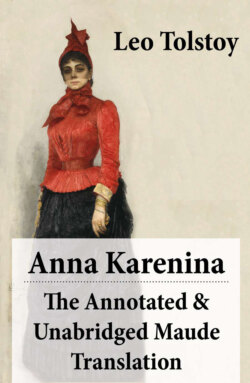Читать книгу Anna Karenina - The Annotated & Unabridged Maude Translation - Leo Tolstoy - Страница 34
На сайте Литреса книга снята с продажи.
Chapter 27
ОглавлениеIT was a large old-fashioned house, and though only Levin was living in it, he used and heated the whole of it. He knew this to be foolish and even wrong, and contrary to his new plans, but this house was a whole world to Levin. It was the world in which his father and mother had lived and died. They had lived a life which appeared to him ideally perfect, and which he had dreamed of renewing with a wife and family of his own.
Levin could scarcely remember his mother. His conception of her was to him a sacred memory, and in his imagination his future wife was to be a repetition of the enchanting and holy ideal of womanhood that his mother had been.
He could not imagine the love of woman without marriage, and even pictured to himself a family first and then the woman who would give him the family. His views on marriage therefore did not resemble those of most of his acquaintances, for whom marriage was only one of many social affairs; for Levin it was the chief thing in life, on which the whole happiness of life depended. And now he had to renounce it.
When he had settled in the armchair in the little drawing-room where he always had his tea, and Agatha Mikhaylovna had brought it in for him and had sat down at the window with her usual remark, ‘I will sit down, sir!’ he felt that, strange to say, he had not really forgotten his dreams and that he could not live without them. With her, or with another, they would come true. He read his book, and followed what he read, stopping now and then to listen to Agatha Mikhaylovna, who chattered indefatigably; and at the same time various pictures of farming and future family life arose disconnectedly in his mind. He felt that in the depth of his soul something was settling down, adjusting and composing itself.
He listened to Agatha Mikhaylovna’s talk of how Prokhor had forgotten the Lord, was spending on drink the money Levin had given him to buy a horse with, and had beaten his wife nearly to death; he listened and read, and remembered the whole sequence of thoughts raised by what he was reading. It was a book of Tyndall’s on heat. He recalled his disapproval of Tyndall’s self-conceit concerning the cleverness of his experiments, and his lack of a philosophic outlook. And suddenly the joyous thought came uppermost: ‘In two years’ time I shall have two Dutch cows in my herd and Pava herself may still be alive; there will be twelve cows by Berkut, and these three to crown all — splendid!’ He returned to his book. ‘Well, let us grant that electricity and heat are one and the same, but can we substitute the one quantity for the other in solving an equation? No. Then what of it? The connection between all the forces of nature can be felt instinctively without all that… . It will be especially good when Pava’s calf is already a red-mottled cow, and the whole herd in which these three will be … ! Splendid! To go out with my wife and the visitors and meet the herd… . My wife will say: “We, Constantine and I, reared this calf like a baby.” “How can you be interested in these things?” the visitor will ask. “All that interests him interests me …” But who is she?’ and he remembered what had happened in Moscow. ‘Well, what is to be done? … It is not my fault. But now everything will be on new lines. It is nonsense to say that life will prevent it, that the past prevents it. I must struggle to live a better, far better, life.’ He lifted his head and pondered. Old Laska, who had not yet quite digested her joy at her master’s return and had run out to bark in the yard, now came back, bringing a smell of fresh air with her into the room and, wagging her tail, she approached him and putting her head under his hand whined plaintively, asking to be patted.
‘She all but speaks,’ said Agatha Mikhaylovna. ‘She is only a dog, but she understands that her master has come back feeling depressed.’
‘Why depressed?’
‘Oh, don’t I see? I ought to understand gentlefolk by this time. I have grown up among them from a child. Never mind, my dear, as long as you have good health and a clean conscience!’
Levin looked at her intently, surprised that she knew so well what was in his mind.
‘Shall I bring you a little more tea?’ she said and went out with his cup.
Laska kept on pushing her head under his hand. He patted her a little, and she curled herself up at his feet with her head on her outstretched hind paw. And to show that all was now well and satisfactory, she slightly opened her mouth, smacked her sticky lips, and drawing them more closely over her old teeth lay still in blissful peace. Levin attentively watched this last movement of hers.
‘And it is just the same with me!’ he said to himself. ‘It is just the same with me. What does it matter… . All is well.’
